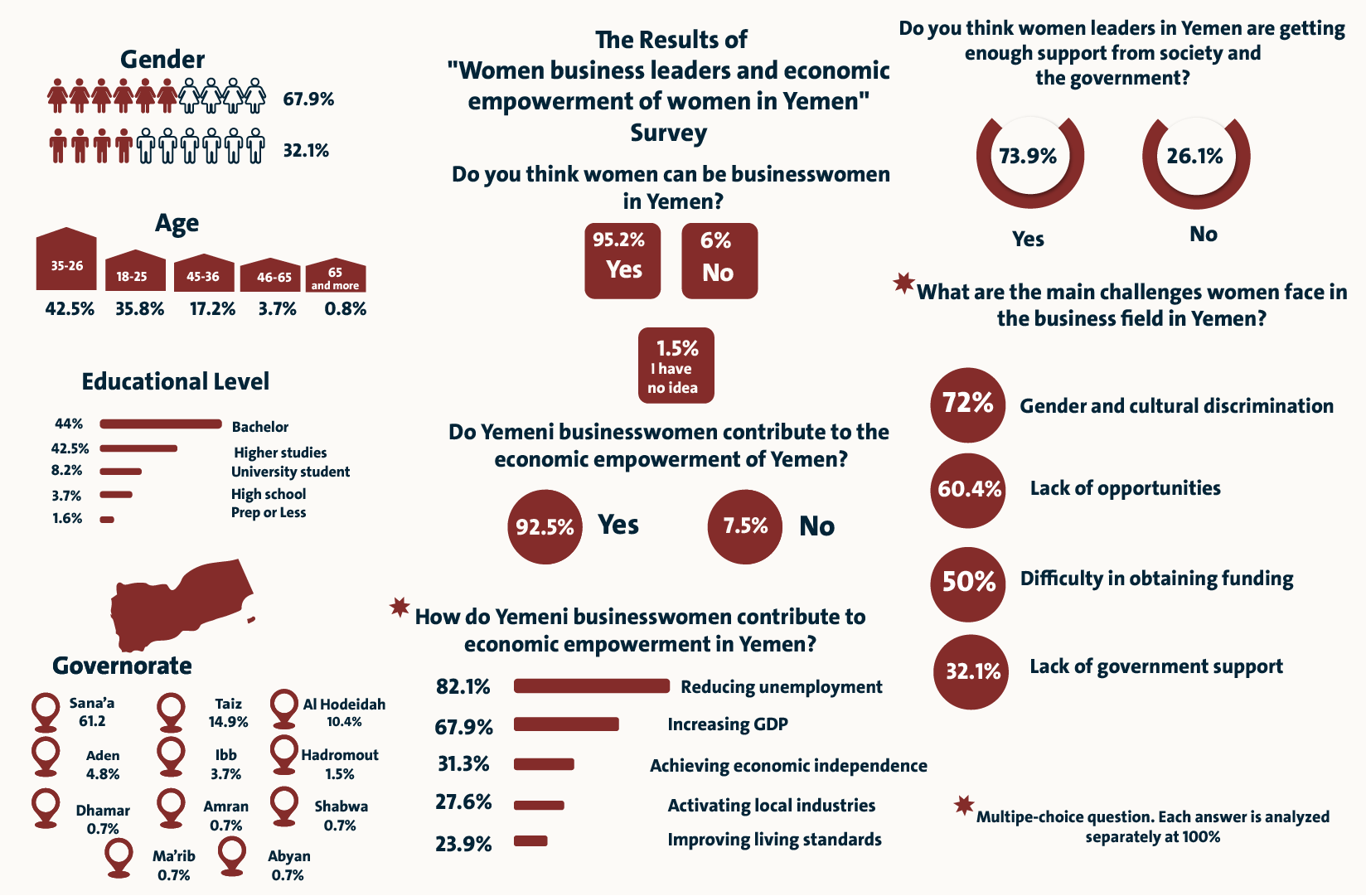Women in Development and Peace – Yomna Al-Zubairi
Overall, entrepreneurship plays a crucial role in strengthening the economies of countries. It boosts GDP, revitalizes the private sector, and generates new job opportunities, thereby reducing unemployment and poverty rates. Entrepreneurship also fosters domestic and international trade, attracts investments, and optimizes local resources. These multifaceted benefits make it a cornerstone of economic stability for any nation.
Yemen has been grappling with economic instability for years, particularly since the conflict began. The conflict directly led to a deterioration in the financial situation, a decline in economic growth, an increase in unemployment rates, and a surge in poverty. The conflict also destroyed economic and social infrastructure, hampered production, and caused the collapse of various economic sectors like agriculture, industry, and trade. Investments and foreign trade suffered as well, with a decline in external funding, and a reduction in trade volume and exports, further complicating the country’s economic situation. These factors make entrepreneurship a vital avenue for rescuing the Yemeni economy and improving individual incomes.
To achieve a thriving economy, it’s crucial to ensure equal opportunities for all members of society in the field of entrepreneurship, including women. Recent years have witnessed a significant increase in women’s participation in the business and project arena. Many Yemeni businesswomen have achieved remarkable success with their own ventures, contributing immensely to economic empowerment, boosting GDP, and achieving equality in access to job opportunities. Despite these successes, numerous challenges and obstacles remain that hinder the increased participation of Yemeni women in entrepreneurship. These include a lack of support, limited opportunities, and cultural restrictions, among others.
In response, the Information and Opinion Research Unit at “Yemen Information Center” conducted a survey titled “Businesswomen and Women’s Economic Empowerment in Yemen”. This survey aimed to gather insights from a sample of Yemeni society regarding women’s participation in entrepreneurship in Yemen, understand its significance in improving the local economy and identify the major difficulties and obstacles faced by businesswomen in Yemen.
The survey was conducted on a research sample of 134 individuals, with 67.9% being women and 32.1% being men. The age groups of the respondents were diverse, with 42.5% falling within the youth category (ages 26-35), 35.8% aged 18-25, 17.2% aged 36-45, 3.7% aged 46-65, and only 0.8% being over 65 years old.
In terms of educational background, the majority of participants held a Bachelor’s degree (44%), followed by a postgraduate degree (42.5%). 8.2% were university students, 3.7% held a high school diploma, and only 1.6% had a secondary school diploma or lower.
Regarding the geographical scope of the survey, the sample was drawn from eleven governorates as follows: Sana’a at 61.2%, Taiz at 14.9%, Al-Hodeida at 10.4%, Aden at 4.8%, Ibb at 3.7%, Hadhramaut at 1.2%, and only 0.7% for each of Dhamar, Amran, Marib, Abyan, and Shabwa.
Key Findings
At the beginning, we asked survey participants whether it is possible for women to become businesswomen in Yemen. 92.5% of them answered ‘yes,’ while 6% expressed doubt that Yemeni women could become businesswomen. The remaining 1.5% stated that they had no idea about the topic.
Regarding the contributions of Yemeni businesswomen to economic empowerment in Yemen, 92.5% believe that Yemeni women significantly contribute to economic empowerment through:”
- Reducing unemployment rates: 82.1%
- Increasing GDP: 67.9%
- Achieving economic independence: 31.3%
- Revitalizing local industries: 27.6%
- Improving living standards: 23.9%
However, 7.5% expressed the view that women entrepreneurs do not contribute to economic empowerment in Yemen. When discussing the support received by women entrepreneurs from the government and society, 73.9% consider it sufficient, while 26.1% believe it falls short.
Undoubtedly, there are several challenges that women face in the business field in Yemen. According to survey participants:
- Gender and cultural bias: 72%
- Limited opportunities: 60.4%
- Difficulties in accessing financing and financial support: 50%
- Inadequate government support and unfavorable legislation: 32.1%
In conclusion, survey respondents agree that women’s presence in Yemen’s business sector will significantly contribute to economic empowerment and play a pivotal role in resolving the country’s economic crisis.”

